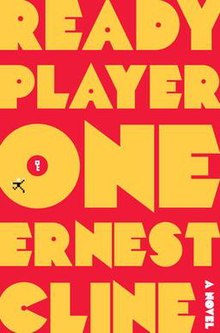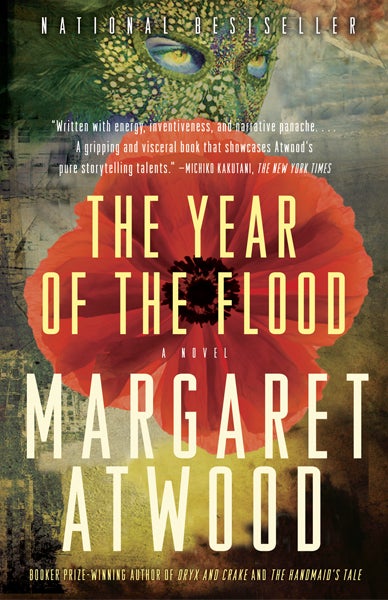The Facts
Length: 372 pages.
Publisher: Crown Publishers.
This is Cline's first novel.
Quick Summary
In the year 2044, protagonist Wade Watts lives most of his life in a broken down van underneath a stack of decrepit car parts, passing by on food stamps gained from fixing broken computers. The rest of the world isn't much better, torn up by irreparable environmental damage and the economy in ruins. The only salvation is OASIS, the universal virtual reality that nearly the entire world plugs into in order to escape their dismal surroundings.
When the enigmatic and mysterious founder of OASIS, James Halliday, dies, he leaves total control of OASIS to whoever can attain his hidden "Easter Egg." Our protagonist stumbles upon the first clue, and it's up to him and his slightly-competitive mix of companions to fend off those necessarily evil corporate interests with a will to kill! (Dundundun)
The story is told in retrospective first-person.
When the enigmatic and mysterious founder of OASIS, James Halliday, dies, he leaves total control of OASIS to whoever can attain his hidden "Easter Egg." Our protagonist stumbles upon the first clue, and it's up to him and his slightly-competitive mix of companions to fend off those necessarily evil corporate interests with a will to kill! (Dundundun)
The story is told in retrospective first-person.
The Good
Definitely a page-turner. The earlier part of the novel is absolutely enthralling, and Cline doesn't do much to halt the suspense. After all, the novel's basic plot revolves around coded messages and trying to find secret passageways and dungeons - what's not to like? It follows to a T the (tried and true) videogame formula, but Cline almost effortlessly ports it to the world of literature.
The Call Me Maybe
I'm still not sure if this is a good thing or a bad thing: Cline definitely will find an audience among "geeks." Which isn't too surprising, considering he wrote the 2009 flick Fanboys. The novel's basis for this is Halliday's obsession with 1980s pop culture (revolving around sci-fi/fantasy film, videogames, and Dungeons and Dragons). To find the Easter Egg, the world dives back into the archives of the 1980s to search for a clues, hints, or meaning behind Halliday's coded words. As readers, we'll love the parts we get - for me, it was the Dungeons and Dragons "stage" of finding the key - but we'll merely enjoy the parts we don't ("Huh?" we'll think. "Blade Runner? Yeah, I guess I need to see that."). It's not a terrible book if you don't understand the references, but it's main strength lies in the understanding that you, the reader, knows what the hell Wade's talking about.
So take a look. I definitely was missing out on almost 99% of this list, and I still thought the novel an intriguing read. But if references that go over your head make you woozy, then you might want to study up before attempting this novel.
http://en.wikipedia.org/wiki/Ready_Player_One#Pop_culture_references_in_the_novel
(On a side note, one side effect of reading this novel is that you'll want to get into the above list. I'm working on watching fantasy films of the 1980s and they are amazingly weird).
The Call Me Maybe
I'm still not sure if this is a good thing or a bad thing: Cline definitely will find an audience among "geeks." Which isn't too surprising, considering he wrote the 2009 flick Fanboys. The novel's basis for this is Halliday's obsession with 1980s pop culture (revolving around sci-fi/fantasy film, videogames, and Dungeons and Dragons). To find the Easter Egg, the world dives back into the archives of the 1980s to search for a clues, hints, or meaning behind Halliday's coded words. As readers, we'll love the parts we get - for me, it was the Dungeons and Dragons "stage" of finding the key - but we'll merely enjoy the parts we don't ("Huh?" we'll think. "Blade Runner? Yeah, I guess I need to see that."). It's not a terrible book if you don't understand the references, but it's main strength lies in the understanding that you, the reader, knows what the hell Wade's talking about.
So take a look. I definitely was missing out on almost 99% of this list, and I still thought the novel an intriguing read. But if references that go over your head make you woozy, then you might want to study up before attempting this novel.
http://en.wikipedia.org/wiki/Ready_Player_One#Pop_culture_references_in_the_novel
(On a side note, one side effect of reading this novel is that you'll want to get into the above list. I'm working on watching fantasy films of the 1980s and they are amazingly weird).
The Bad
We're told from the dust-jacket that Wade will have to "face up to life in the real world" in order to unlock the Easter Egg's mystery, but the real-world scenes are hard to digest. Don't think that there's any major character building going on in this book.
Wade Watts is relatable in the sense that life is astoundingly terrible. But he can never quite become that heroic character that I think Cline was trying to make him. There's a part where Wade puts on his sunglasses (not really) and infiltrates the bad guys in order to execute a master plan to save them all, but that whole section falls flat on its face. It's incredibly tough to believe that Wade, sort of a fumbling character up to this point, is able to become a sort of secret super-spy. Cline wants to reinforce the fact that reality is hardly perfect or beautiful (behind the computer screens, almost every good guy is "uglier" or "defective" than their avatars) - yet here we have Wade become exactly that: perfect, intelligent, beautiful (he buffs up before he pulls his stunt).
The romance subplot left a bad taste in my mouth. The "relationship" between Art3mis and Parzival (Samantha and Wade) felt incredibly bland. Boy meets girl online, falls violently in love with the idea of her. "Get a kiss and omgosh is soo perfect. I luv u just the way u are bb." ARRRRG. Art3mis's reactions are interesting - she's a little bit defensive about the whole idea - but her defensiveness ultimately feeds off her low self-esteem rather than any real intelligence or rationality. And that ruined it for me.
Wade Watts is relatable in the sense that life is astoundingly terrible. But he can never quite become that heroic character that I think Cline was trying to make him. There's a part where Wade puts on his sunglasses (not really) and infiltrates the bad guys in order to execute a master plan to save them all, but that whole section falls flat on its face. It's incredibly tough to believe that Wade, sort of a fumbling character up to this point, is able to become a sort of secret super-spy. Cline wants to reinforce the fact that reality is hardly perfect or beautiful (behind the computer screens, almost every good guy is "uglier" or "defective" than their avatars) - yet here we have Wade become exactly that: perfect, intelligent, beautiful (he buffs up before he pulls his stunt).
The romance subplot left a bad taste in my mouth. The "relationship" between Art3mis and Parzival (Samantha and Wade) felt incredibly bland. Boy meets girl online, falls violently in love with the idea of her. "Get a kiss and omgosh is soo perfect. I luv u just the way u are bb." ARRRRG. Art3mis's reactions are interesting - she's a little bit defensive about the whole idea - but her defensiveness ultimately feeds off her low self-esteem rather than any real intelligence or rationality. And that ruined it for me.
Final Thoughts
Don't let the numbers fool you (or the number of words, I guess). I liked this book. It's strengths more than make up for its weaknesses. Just don't go expecting any great character study or insight into human interaction - it's a fun novel, a summer read for those who'd rather stay inside.
Arbitrary Score: 3.8 out of 5.
Next book: Freedom: A Novel, by Jonathan Franzen (2010)









